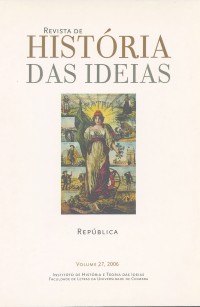Please use this identifier to cite or link to this item:
https://hdl.handle.net/10316.2/41648| DC Field | Value | Language |
|---|---|---|
| dc.contributor.author | Almeida, Pedro Tavares de | - |
| dc.contributor.author | Sousa, Paulo Silveira e | - |
| dc.date.accessioned | 2017-05-07T22:23:23Z | |
| dc.date.accessioned | 2020-09-30T11:26:24Z | - |
| dc.date.available | 2017-05-07T22:23:23Z | |
| dc.date.available | 2020-09-30T11:26:24Z | - |
| dc.date.issued | 2006 | - |
| dc.identifier.issn | 0870-0958 | - |
| dc.identifier.issn | 2183-8925 (digital) | - |
| dc.identifier.uri | https://hdl.handle.net/10316.2/41648 | - |
| dc.description.abstract | Portugal foi uma das mais duradouras potências coloniais europeias. O longo ciclo imperial que se desenrolou entre 1415 e 1975 atravessou fases distintas e deixou marcas em várias regiões do mundo. No século XIX e começos do século XX, Portugal era um pequeno país periférico e rural, incapaz de acompanhar o crescimento económico das principais potências da época. Contudo, e apesar das tentações imperialistas de outros Estados europeus, nunca deixaria de manter a sua esfera de influência colonial. Em 1822, a independência do Brasil implicou a "re-centragem" do Império nas colónias africanas; a partir da década de 1880, a ocupação territorial intensificou-se; a I República, marcada por uma forte ideologia nacionalista, daria um novo ímpeto à administração e desenvolvimento dos territórios ultramarinos. Seria então criado pela primeira vez um Ministério das Colónias (1911). Este artigo começa por descrever em traços gerais a evolução da política colonial ao longo de um século, de 1820 a 1926. Em seguida, analisa o modo como as estruturas burocráticas centrais que geriam os assuntos coloniais se foram transformando e complexificando, convertendo- -se numa rede hierárquica de unidades administrativas especializadas, com critérios mais exigentes na selecção e promoção dos funcionários (por ex., a valorização da formação profissional nos territórios coloniais). Finalmente, procede ao estudo prosopográfico das elites política e administrativa (ministros e directores-gerais) do Ministério da Marinha e Ultramar, e depois do Ministério das Colónias, examinando a composição e perfil de ambos os grupos e o impacto que teve a mudança de regime em 1910. | por |
| dc.description.abstract | Portugal was one of the first and most enduring European colonial powers of modern times: 1415 and 1975 mark the beginning and the end of a long empire cycle that left impressive imprints in many places. From the beginning, overseas expansion and the exploitation of colonial resources were closely linked to state-building and the preservation of national independence. A forerunner at the Great Age of Discoveries, but a latecomer in the era of industrialization, in the 19th and early-20th centuries, Portugal was a peripheral country, and the economic gap with the rich and industrialized core of Europe was wide. During this period, however, the country faced the critical challenge of ruling vast and geographically scattered overseas territories, and of preserving them from the greed of strong imperialist powers. This article starts by outlining the major developments in Portuguese colonial policy over a century, from the 1820s to 1926. The independence of Brazil (1822) was a crucial turning point, which brought about a shift towards Africa. The First Republic (1910-1926), pervaded by a nationalist ideology, gave a new impetus to the efforts toward a more effective colonization. Symptomatically, a Ministry of Colonies was then established for the first time. Second, it describes and analyses the transformation of the central office for colonial affairs - from a small ministerial department to an autonomous ministry -, stressing the increasing bureaucratic specialization, the growth of the apparatus and its staff, and the introduction of new criteria for the selection and promotion of permanent officials (namely a higher profile given to careers in local colonial administration). Finally, it presents a collective biography of both the politicians (cabinet ministers) and the administrators (directors-general) who ran the Colonial Office for a large period of the Constitutional Monarchy (from 1851 to 1910) and during the First Republic, thus enabling the assessment of the impact of regime change on elite circulation and career patterns. | eng |
| dc.language.iso | eng | - |
| dc.publisher | Imprensa da Universidade de Coimbra | - |
| dc.rights | open access | - |
| dc.title | Ruling the empire: the Portuguese colonial office (1820s-1926) | por |
| dc.type | article | - |
| uc.publication.collection | Revista de História das Ideias vol. 27 | - |
| uc.publication.firstPage | 137 | - |
| uc.publication.lastPage | 169 | - |
| uc.publication.location | Coimbra | - |
| uc.publication.journalTitle | Revista de História das Ideias | - |
| uc.publication.volume | 27 | por |
| dc.identifier.doi | 10.14195/2183-8925_27_5 | - |
| uc.publication.orderno | 6 | - |
| uc.publication.area | Artes e Humanidades | - |
| uc.publication.manifest | https://dl.uc.pt/json/iiif/10316.2/41648/248397/manifest?manifest=/json/iiif/10316.2/41648/248397/manifest | - |
| uc.publication.thumbnail | https://dl.uc.pt/retrieve/11860693 | - |
| item.grantfulltext | open | - |
| item.fulltext | With Fulltext | - |
| Appears in Collections: | Revista de História das Ideias | |
Files in This Item:
| File | Description | Size | Format | |
|---|---|---|---|---|
| ruling_the_empire.pdf | 8.84 MB | Adobe PDF |  |
Items in DSpace are protected by copyright, with all rights reserved, unless otherwise indicated.
